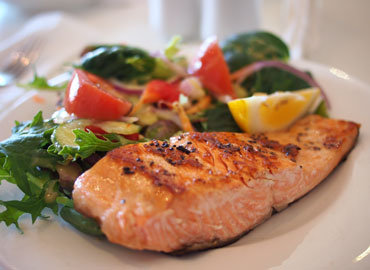
June 11, 2018
Older men and women who eat a healthy diet tend to have larger brains, which may help to protect against dementia. Those are the findings of a new study from the Netherlands that found that, using a very large cohort of individuals, a diet rich in vegetables, fruit, whole grains, nuts, dairy and fish and low in sugary beverages were associated with larger brain volumes.
“People with greater brain volume have been shown in other studies to have better cognitive abilities,” said study author Dr. Meike Vernooij of the Erasmus University Medical Center in Rotterdam. “Initiatives that help improve diet quality may be a good strategy to maintain thinking skills in older adults.”
The researchers found that a high quality diet was tied to larger overall brain volume, including a larger hippocampus, a part of the brain critical for learning and memory. The hippocampus is one of the first areas of the brain to be affected by Alzheimer’s disease.
For the study, researchers looked at the diets of 4,213 older men and women, average age 66, who were free of dementia. They filled out detailed food questionnaires about what they had eaten in the previous month. The questionnaire asked about some 400 foods and food groups, including vegetables, fruit, whole grain products, legumes, nuts, dairy, fish, tea, unsaturated fats and oils of total fats, red and processed meat, sugary beverages, alcohol and salt.
Diets were ranked on a scale of zero to 14. The healthiest diet, at 14, contained the largest amounts of vegetables, fruits, nuts, whole grains, dairy and fish and little or no sugary drinks.
Study participants also underwent MRI brain scans that measured the size of the brain as well as any defects that may be signs of impending problems, or worse, dementia.
The researchers found that a higher diet score was linked to larger total brain volume. They took into account head size differences as well as factors that might affect brain health such as age, sex, education, smoking and physical activity.
Those who consumed a healthier diet had an average of 2 milliliters (about 1/12 of an inch) more total brain volume than those who did not. To compare, having a brain volume that is 3.6 milliliters smaller is equivalent to about one year of aging. The findings appeared in Neurology, the medical journal from the American Academy of Neurology.
The researchers note that the study was a snapshot in time and does not prove that a better diet results in a larger brain volume. Rather, it only shows an association between eating a healthy diet and brain health.
But numerous earlier studies have shown that a heart-healthy diet is also good for the brain. A Mediterranean-style diet, for example, has also been tied to larger brain volume and a lower risk of Alzheimer’s and other forms of dementia. The Mediterranean diet, rich in vegetables and fruits, whole grains, fish and “good” fats like olive oil and low in meats and saturated fats, has long been heralded for heart health.
The findings add to a growing body of evidence that what you eat can benefit brain health and may help to delay the onset of Alzheimer’s disease and other forms of dementia. As we age, the brain shrinks, and we lose brain cells (also called nerve cells or neurons) critical for memory. Having more of those cells may help to protect cognitive health should some of them die off because of Alzheimer’s disease.
Many other factors besides diet, including the genes you inherit and advancing age, play an important role in who ultimately develops Alzheimer’s. Still, a heart-healthy lifestyle, and what you eat, may help keep the brain young.
By ALZinfo.org, The Alzheimer’s Information Site. Reviewed by Marc Flajolet, Ph.D., Fisher Center for Alzheimer’s Research Foundation at The Rockefeller University.
Source: Pauline H. Croll, MSc, Trudy Vortman, PhD, M. Arfan Ikram, MD, PhD, et al: “Better Diet Quality Related to Larger Brain Tissue Volumes: The Rotterdam Study.” Neurology, Vol. 90, pages 1-8, May 18, 2018











